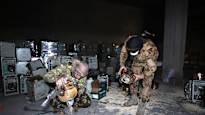The Assad regime has long been accused of producing and selling the addictive amphetamine-like stimulant captagon.
In Syria, an industrial-scale drug laboratory has been found on the western edge of Damascus, which is believed to have been operated by the ousted president Bashar al-Assad under administration.
Western countries have long accused the Assad regime of producing and selling the addictive amphetamine-like stimulant captagon. The drug has been trafficked throughout the Middle East, from war zones to construction sites and parties of the local elite, reports news agency Reuters.
In the last decade, Captagon was also known as a stimulant for Isis fighters.
According to experts, captagon’s annual trade is worth billions of dollars. Western governments have linked Syria’s illegal drug trade to Assad’s brother, to Maher al-Assadand to the fourth division of the Syrian army under his command.
Director of New Lines Institute, a New York think tank Caroline Rose estimated to Reuters that the global captagon business is worth about $10 billion. The ousted Syrian leadership’s annual profits from it are about $2.4 billion.
According to Rose, the captagon laboratory found now is possibly the largest drug laboratory of the Assad regime. In the days after Assad’s fall, rebel fighters say they found several sites around the country where the drug was being manufactured and prepared for export.
“Poor man’s cocaine”
Captagon was the brand name of a stimulant first produced in Germany in the 1960s to help treat attention deficit disorder and narcolepsy.
Its production was discontinued, but illegal versions of the “poor man’s cocaine” continued in Eastern Europe and later in the Arab world. It emerged in the Syrian conflict after anti-government protests erupted in 2011.
Captagon improves concentration and prevents drowsiness and hunger. It is banned in many countries, including the United States, and can have harmful side effects. The active substance of Captagon is phenethylline.
Its prevalence has led to increasing drug abuse in the Arab states of the Persian Gulf. The biggest market for captagon is in Saudi Arabia.
